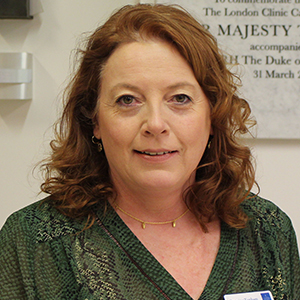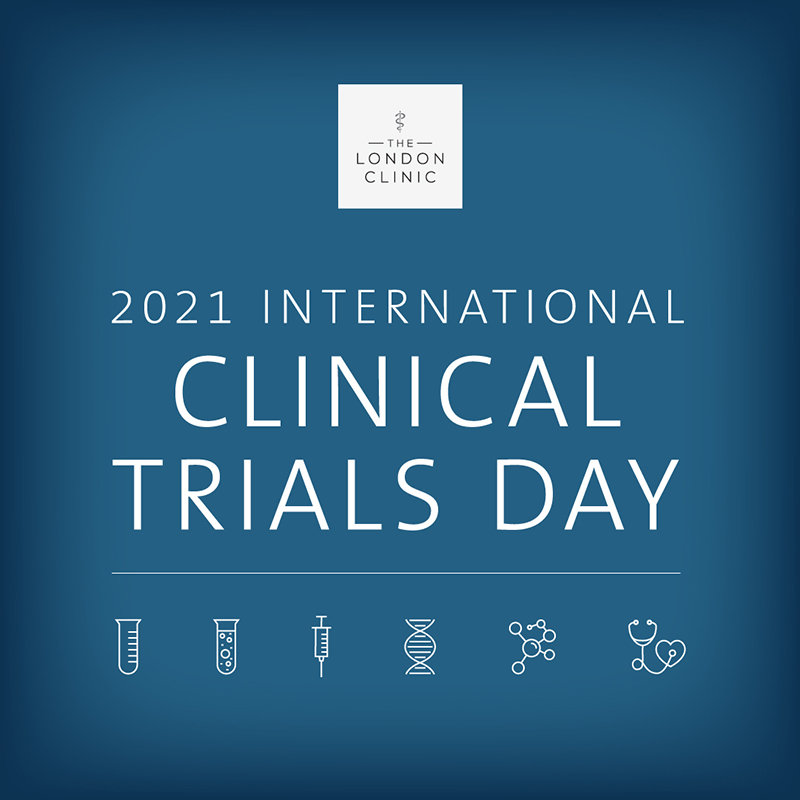The rapid development of the COVID-19 vaccines shone a light on clinical research and the importance of community in pursuing better healthcare. Globally, scientists came together to prevent this deadly virus from claiming more lives. This International Clinical Trials Day (20 May), we caught up with Christine Topham, The London Clinic Research Centre’s Clinical Trial Manager, to hear the latest on her department’s crucial work and why this new public awareness is a good thing.

About Christine Topham
Christine provides operational oversight of The London Clinic Research Centre. This includes the management and support of all research studies and personnel involved in sponsored and hosted trials from feasibility through to completion, ensuring all research is delivered on time, to a high quality, according to agreed protocols and in accordance with appropriate clinical trial regulations, SOPs and policies.
Firstly, what is a clinical research centre?
Put simply, a clinical research centre is a department or facility that supports research relating to healthcare sciences.
The London Clinic Research Centre (CRC) is a dedicated department responsible for managing and conducting clinical trials and other forms of research at the hospital. Our work is varied but can, ultimately, include determining the safety and efficacy of medications and treatments.
Our job is to oversee both the research projects themselves and the research participant’s journey. We also provide support to help researchers in running high-quality trials.
This can lead to innovative treatment choices being brought to our patients, and can enable access to novel therapies that may not be available elsewhere.

What areas of research does the department cover?
Our centre supports most types of research, covering the likes of oncology, orthopaedics and gastroenterology.
As well as providing research services for our commercial partners, The London Clinic’s charitable status means we can support academic work, which is very exciting.
Of course, before undertaking each research project, we always consider its feasibility and if it is the right fit for the clinic.
Our team also works in collaboration with commercial partners and the NHS to facilitate research delivery and can provide vendor support for specific requirements for a clinical trial.
Vendor support means we would provide use of equipment at the clinic, such as an MRI scanner.
Which clinical trials and other forms of research is The London Clinic's research centre involved in?
We’re currently involved in 16 ongoing projects covering a variety of therapeutic areas.
One of them is in partnership with The Pancreatic Cancer Research Fund Tissue Bank. We’re helping to accelerate research into pancreatic cancer by analysing samples donated by pancreatic cancer patients and their close relatives. And we’re very proud of it!
This complex cancer has one of the worst survival rates of any forms of cancer. We’re hopeful that this crucial research will lead to better treatments and earlier diagnosis for pancreatic cancer patients.
What is the role of patient/ participant within a clinical trial and what type of processes would they experience during a trial?
The patients/participants are vitally important. Without their involvement in research we wouldn’t be able to move forward with new therapies or treatments.
Although the global need to develop a COVID-19 vaccine resulted in urgent clinical research and remarkably quick vaccine development, the preparation stage for a clinical trial before patients are involved takes a lot longer than people may think.
Likewise, the length of time for the clinical trial itself can vary greatly. An early, small-scale Phase 1 study, where we work with a small group of healthy volunteers, is relatively short.
This time period would be very different to a late-stage, larger scale Phase 3 study, which is when we look for long-term outcomes by working with patients who have the specific condition we are hoping to treat.
In terms of the practical side of the experience, we’re in regular contact with the patient/participant. Before they take part, we walk them through a patient information sheet so they understand how things will work.
We explain what the research will involve, how many times they will need to visit the hospital, and any medication or device they will encounter – all the time answering any questions or concerns they may have. We try to make it a conversational process, providing them with any support they need.
Ultimately, participating in a research project gives patients a ‘voice’ as to what their care looks like. I believe taking part in a clinical trial can be quite an altruistic act. For example, we see cancer patients taking part in trials for new treatments when there are no other solutions available to them.
Has research by the department resulted in the development of new treatments for patients?
Clinical trials can take a long time, but we have some success stories! For instance, we were involved in a study for intra-operative radiotherapy (IORT). This is a new form of treatment for breast cancer and allows patients to receive surgery and radiotherapy in just one session.
This was a brilliant breakthrough as, usually, breast cancer patients are required to undergo quite gruelling radiotherapy after surgery. This new treatment method greatly reduces the treatment time and side effects, decreasing the overall impact on the patient.
Away from oncology related research, we’ve been involved in providing new insights into the impact of marathon running on hips, and have worked with Mr Dinesh Nathwani, a Consultant Orthopaedic Surgeon, on three orthopaedic studies involving devices used within the knee.
How has COVID-19 impacted work done by the department and the overall awareness for clinical research?
When the pandemic hit last year, all research was halted and our focus shifted completely towards COVID-related research.
Although as a designated COVID-free zone we weren’t able to support research that involved COVID-19 patients, we were able to take part in research that looked at the global impact of the pandemic and the effects it had on cancer patients undergoing elective surgery.
Due to the impact of the pandemic on the NHS, we’ve also helped by alleviating the bottlenecks of NHS research not related to COVID-19 by supporting study delivery. We’ve done this by working in collaboration with NHS trusts and providing various clinical trial services.
The COVID-19 pandemic has certainly increased overall interest in the societal benefits of clinical research, however many patients understandably aren’t very keen to visit a hospital at the moment. I am hopeful that over time this anxiety will reduce.
What are the department's plans for the future?
We want to continue developing innovative treatments that may not be possible elsewhere by engaging more patients into research.
Hopefully, thanks to the success of the COVID-19 vaccine trials – and the publicity that came with it – interest in clinical research will continue increasing. Ultimately, our mission is to develop life-saving treatments for patients. The more awareness for that mission, the better.
Further information
Clinical Research Centre
Disclaimer
Any views expressed in this article are those of the featured specialist(s) and should not be considered to be the views or official policy of The London Clinic.